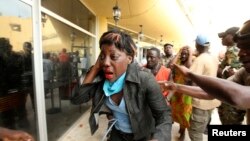ABIDJAN —
Amnesty International is accusing Ivory Coast’s government of using the courts and security forces to persecute supporters of former president Laurent Gbagbo - who is facing a possible trial before the International Criminal Court in the Hague. Amnesty's report is the latest voice of concern that there is one-sided justice, following the country’s recent post-election conflict.
Tensions continue to run high in Ivory Coast nearly two years since the end of post-election violence that began after Laurent Gbagbo refused to accept that he had lost the 2010 election to Alassane Ouattara, the current president.
More than 3,000 people died during six months of combat and fighters loyal to both men allegedly committed war crimes.
To make matters worse, a wave of attacks began last August by unidentified gunmen on security installations throughout the country. In response, Amnesty International says President Ouattara’s security forces rounded up hundreds of Gbagbo supporters, many of whom were subjected to ill-treatment and torture.
In a new report this week, Amnesty says the most extreme methods of abuse were electric shock and the burning of detainees’ bodies with molten plastic.
Gaëtan Mootoo, the Amnesty researcher who authored the report, says the security forces’ behavior is an example of so-called victor’s justice. To date, only Gbagbo supporters have been arrested and detained in connection with the post-election violence, despite the fact that rights groups have also implicated many high-level Ouattara backers in abuse.
“There can’t be reconciliation without proper justice," he said. "These people, I mean everybody knows them. We can’t say, ‘Where are they?’ Everybody knows them. And, even some of them have been targeted by the U.N. and their names are known and they could easily be identified.”
Mootoo says the problems facing the country have been especially visible in the west, where Ouattara’s army has apparently teamed up with traditional hunters, known as dozos, to provide security. Ever since the conflict ended, Gbagbo supporters have complained of violations ranging from arbitrary arrests to extrajudicial killings in the region.
Last July, a camp for displaced persons was overrun by an angry mob in the western town of Duekoue. Like other human rights groups, Amnesty says it is clear that dozos and soldiers were involved in the attack, which killed at least eight people.
Mootoo notes that, given the one-sided nature of the judiciary for the past two years, there is no reason to expect a credible investigation from the national courts. The new Amnesty report calls for an international commission of inquiry into the attack on the camp - what may be the most significant incident of violence against civilians since the post-election conflict ended.
“Of course, they told us that they have opened an inquiry. But, at the same time, they have done that on other, similar cases and we haven’t seen anything yet. This is why we are asking for an international commission of inquiry," he said.
In a written response to Amnesty, Ivorian authorities do not address specific allegations laid out in the report. Ivorian authorities have previously vowed to bring to justice all perpetrators of crimes both during and after the conflict, regardless of political affiliation.
Tensions continue to run high in Ivory Coast nearly two years since the end of post-election violence that began after Laurent Gbagbo refused to accept that he had lost the 2010 election to Alassane Ouattara, the current president.
More than 3,000 people died during six months of combat and fighters loyal to both men allegedly committed war crimes.
To make matters worse, a wave of attacks began last August by unidentified gunmen on security installations throughout the country. In response, Amnesty International says President Ouattara’s security forces rounded up hundreds of Gbagbo supporters, many of whom were subjected to ill-treatment and torture.
In a new report this week, Amnesty says the most extreme methods of abuse were electric shock and the burning of detainees’ bodies with molten plastic.
Gaëtan Mootoo, the Amnesty researcher who authored the report, says the security forces’ behavior is an example of so-called victor’s justice. To date, only Gbagbo supporters have been arrested and detained in connection with the post-election violence, despite the fact that rights groups have also implicated many high-level Ouattara backers in abuse.
“There can’t be reconciliation without proper justice," he said. "These people, I mean everybody knows them. We can’t say, ‘Where are they?’ Everybody knows them. And, even some of them have been targeted by the U.N. and their names are known and they could easily be identified.”
Mootoo says the problems facing the country have been especially visible in the west, where Ouattara’s army has apparently teamed up with traditional hunters, known as dozos, to provide security. Ever since the conflict ended, Gbagbo supporters have complained of violations ranging from arbitrary arrests to extrajudicial killings in the region.
Last July, a camp for displaced persons was overrun by an angry mob in the western town of Duekoue. Like other human rights groups, Amnesty says it is clear that dozos and soldiers were involved in the attack, which killed at least eight people.
Mootoo notes that, given the one-sided nature of the judiciary for the past two years, there is no reason to expect a credible investigation from the national courts. The new Amnesty report calls for an international commission of inquiry into the attack on the camp - what may be the most significant incident of violence against civilians since the post-election conflict ended.
“Of course, they told us that they have opened an inquiry. But, at the same time, they have done that on other, similar cases and we haven’t seen anything yet. This is why we are asking for an international commission of inquiry," he said.
In a written response to Amnesty, Ivorian authorities do not address specific allegations laid out in the report. Ivorian authorities have previously vowed to bring to justice all perpetrators of crimes both during and after the conflict, regardless of political affiliation.




